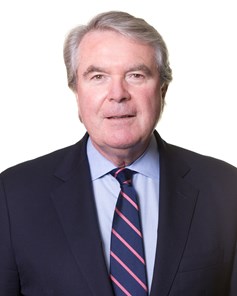5 minutes with... Edward McDonald
 When did you decide to become a lawyer? Why?
When did you decide to become a lawyer? Why?
My senior year in college. It was a process of elimination: I didn’t care for math and science; I didn’t want a business career; I didn’t want to teach. Most of my college friends were going to law school. And going to court looked like fun.
Starting out, what did you expect from a career in the law?
An interesting life.
Has it lived up to your expectations?
Absolutely. I started as a federal district court clerk, a fascinating job. I then spent five exciting years as a Manhattan ADA. For the next 13 years, I was the Deputy Chief and then Chief of the Federal Organized Crime Strike Force in Brooklyn, where I investigated, tried, supervised and argued appeals in many of the most important political corruption, organized crime and labor racketeering cases in the nation. My time in private practice, since 1989, has been filled with challenging and exciting engagements here in New York and all over the world. I am still having a very interesting and rewarding career.
How did you get into the areas of law you are known for today? By design? Chance? Both?
I didn’t start out planning to be a white-collar partner at a big international law firm. In law school, I got interested in trial work. That led to the DA’s office, which led to the Justice Department and the Brooklyn Strike Force. Three kids and tuition bills led to private practice, and here I am.
What do you consider to have been your big break?
Getting hired at and then being appointed as the Attorney in Charge of the Brooklyn Strike Force, where I had the opportunity to handle some of the most noteworthy criminal prosecutions of the 1980s. My successes in those cases opened doors for me in private practice.
What differences do you see in today's legal market compared to when you started?
Compared to 1989, when I entered private practice, there is infinitely more white-collar and securities enforcement work, not just in the US but worldwide. Years ago, white-collar practitioners were looked upon with disdain at the big firms; today, virtually every litigator at every big firm claims to have white-collar expertise. Just go to the websites of major law firms and see how many lawyers whose bios reveal no criminal or securities enforcement experience list themselves on their firm’s white-collar roster. There’s lots more competition.
What achievement are you most proud of?
Besides having a wonderful wife and raising three great kids, I have great pride in several of my accomplishments as a prosecutor (successfully prosecuting a US Senator, five US Congressmen, the leadership of four of New York’s five Mafia families, and 57 corrupt labor union officials) and many things that I have done to help my clients in 26 years of private practice.
What do you consider your greatest failure or regret?
Quitting the freshman basketball team at Boston College.
What have you enjoyed most during your career in the legal profession?
Working with good friends and mentoring young lawyers on challenging and exciting cases – both as a prosecutor and in private practice.
And enjoyed least?
Getting bills collected.
What law would you change, abolish or create?
I would abolish the Second Amendment to the Constitution and then create laws restricting gun ownership to only the most limited circumstances.
Who is your legal hero?
The two previous Manhattan District Attorneys, Frank Hogan and Bob Morgenthau, who served from 1942 to 2009.
What career would you have in your second life?
Same one. If not, movie actor.
What slogan would you like to be remembered by?
I don’t have one. Although many people seem to remember my line in Goodfellas, “Don’t give me the babe in the woods routine, Karen.”
“Don’t give me the babe in the woods routine, Karen.”
What advice would you give to students trying to enter the legal profession today?
Private practice is difficult. It is not just the pleasure of practicing law; it is a business in which you have to get clients, send out bills and get bills paid. On the other hand, while there are fewer headaches in the public sector, it is difficult to survive on a public servant’s salary.
And secondly, to those who hope to ultimately get into the areas of law in which you are an expert?
Get involved in public service early on. Such work provides the experience and contacts that are critical to success in private practice.
How was it being a part of Martin Scorsese's smash hit Goodfellas?
How would you feel if you got to hang out with Martin Scorsese, Robert De Niro, Ray Liotta and Lorraine Bracco for a few days and realized a year later you were lucky enough to make the cut in what turned out to be a film classic? I have had lots of stories to tell for the past 25 years.
Do you think Hollywood does a good job of depicting courtroom tussles on the big screen?
Never. Real-life courtroom dramas unfold far too slowly for the big screen. Everything is abbreviated and distorted in the movies.
Do you have a favorite law-themed movie?
Goodfellas – what else? Second place –The Verdict with Paul Newman, even though it was entirely unrealistic.
Finally, if you could pick any Hollywood actor – either past or present – to play you in a movie, who would you choose?
Paul Newman or George Clooney (he was great in Michael Clayton).